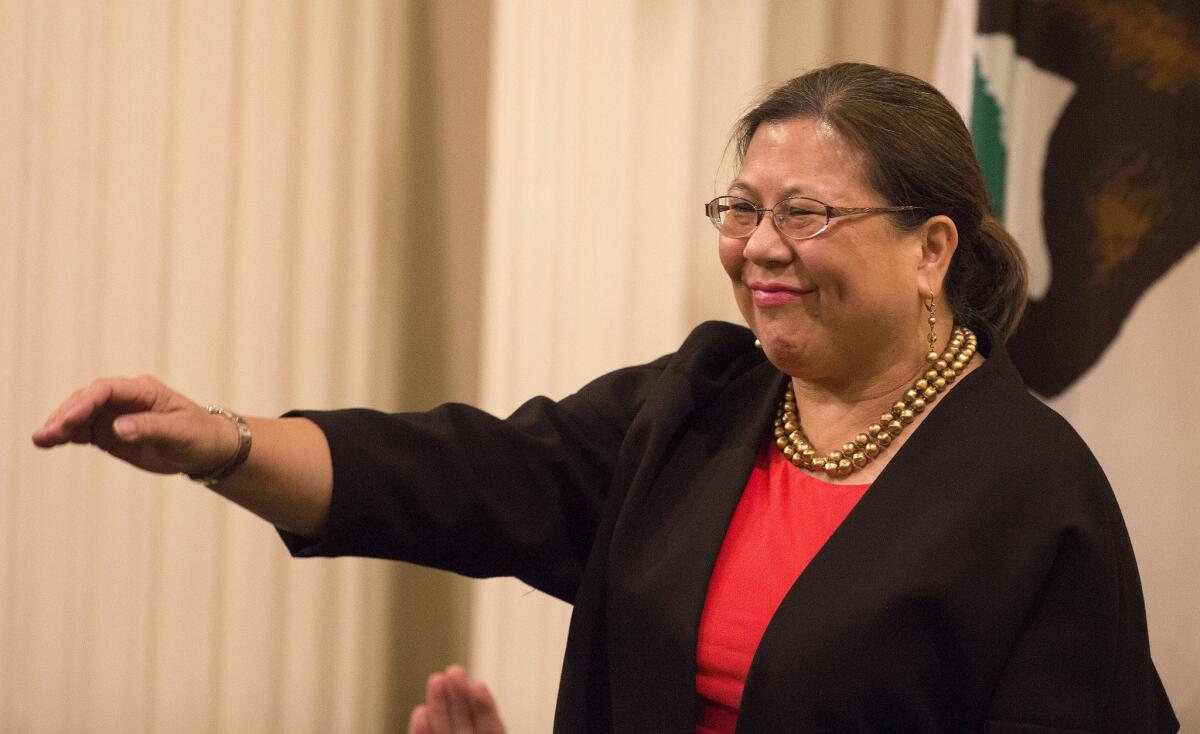Capitol Journal: Taxing Dodgers tickets would be a fiscal win for the state

- Share via
Reporting from In Sacramento — If California applied the sales tax to Dodgers tickets and other sporting events, it could raise $320 million a year.
And why would the state do that? To lower the overall sales tax rate, rely less on the roller-coaster income taxes of rich people and overhaul California’s rickety, archaic revenue system. Lift it out of the mid-20th century and into the 21st.
It would have to do much more, of course, than merely tax spectator sports.
It could tax the services of agents for athletes, movie stars and other entertainers. That would generate $234 million, according to a report released last week by state Controller Betty Yee.
Taxing auto repair labor would net $1 billion. Now, just the parts are taxed.
Lawyer work? That’s potentially $3.6 billion.
A long list of tax targets has been gabbed about for half a century in Sacramento. But most politicians are cowards on the subject.
It involves extending the sales tax to services and matching revenue with reality. In recent decades, California’s economy — sixth largest in the world — has shifted dramatically from being driven predominately by manufacturing to services.
We’re taxing retail sales but not services. Consequently, the sales tax isn’t producing nearly what it used to. In 1950, it supplied 60% of state general fund revenue. Today, it’s only about 22%.
To fill that gap, we’ve greatly escalated the income tax. In 1950, it filled just 10% of the general fund. Today it’s about 70%. And nearly half of that comes from the top 1%, whose incomes — especially their capital gains — function like a yo-yo.

When the inevitable recession hits, state revenue plummets much more precipitously than the economy, forcing painful cuts in government programs that benefit mainly the poor and middle class.
Moody’s Investor Services recently ranked California the state least able to handle a recession.
The solution is to broaden the revenue base, taxing more things while lowering current rates on sales, businesses and high incomes. Tax services used particularly by the wealthy, such as accounting. Taxing that alone would produce $2.7 billion.
Everyone in Sacramento instinctively knows this, but you can count on one hand — make it two fingers — the politicians courageous enough to speak out. Most voters are so cynical about government that any mention of the T-word immediately raises suspicions and red flags for politicians.
“If comprehensive reform were easy, we would have achieved it by now,” says Yee, who has been pushing this issue for years.
But even Yee shied away from proposing a specific fix after a panel of experts she created produced a lengthy report outlining the problem and cataloging possible tax sources.
Any specific proposal, she knew, would set off cries of condemnation from special interests.
“I wanted to give the public a lot to chew on,” Yee says. “What I’m trying to do is have this conversation before the whole thing collapses.”
Her panel added up $111.5 billion in total revenue that could be raised by taxing every service known to mankind. And, of course, that’s a fantasy. It’s nearly as much as the general fund itself, $122 billion.
We’re not going to tax dental care, which would produce $1.5 billion, or doctor visits ($5.2 billion), nursing home stays ($835 million) or zoo and botanical garden strolls ($26 million). But maybe golf memberships ($156 million) and workouts at fitness centers ($313 million).
The report also identified several income tax credits and deductions that the bureaucrats call “tax expenditures.” But few could be eliminated, nor should they be.
Example: Dumping the deduction for home mortgage interest would raise $5 billion. Forget it. But how about just for vacation homes? That would pull in $220 million.
California’s tax structure basically has not changed since the Great Depression when the income and sales taxes were imposed. But it was significantly altered in 1978 when voters approved property tax-cutting Proposition 13.
To make up for local property tax losses, other taxes were hiked and the state kicked in tons more money for public schools, cutting into its funding for universities.
“We have to deal with the property tax,” Yee says, meaning reshape it. That takes guts to even suggest.
The only other person in Sacramento trying to promote tax reform is Sen. Bob Hertzberg (D-Van Nuys), a former Assembly speaker. He introduced a bill 18 months ago but hasn’t generated enough support even to justify a committee hearing.
His bill, he says, would cut taxes for most Californians and force out-of-state corporations to “pay their fair share.”
“I’m passionate about it,” he says. “But it’s not something you can just wake up one day and change.”
Hertzberg hopes Gov. Jerry Brown will eventually see fixing taxes as a legacy-builder. But Brown is only starting to show interest.
“It’s a puzzle,” the governor told reporters last month. “Maybe over the next year or two Republicans can join in and we can come up with something that would make sense. But it’s not that simple.
“There’s a reason why we tax the 1%. It’s because that’s a tax that people have shown they are willing to vote for.”
The teachers union is sponsoring a November ballot initiative to extend Brown’s 2012 “temporary” soak-the-rich tax increase for 12 more years. If it passes, you can forget tax reform.
If it doesn’t, that might force Sacramento to create a modern tax system that works. In times of both boom and bust.
Follow @LATimesSkelton on Twitter
ALSO
L.A. County putting pressure on Sacramento to impose a ‘millionaires’ tax’ to combat homelessness
State Controller Betty Yee wants tax reform that relies less on the top 1%
More to Read
Get the L.A. Times Politics newsletter
Deeply reported insights into legislation, politics and policy from Sacramento, Washington and beyond. In your inbox twice per week.
You may occasionally receive promotional content from the Los Angeles Times.











